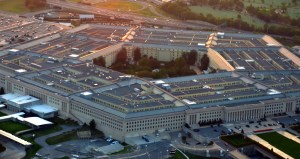DOD should better define its place in space industry, report says, with information systems in mind

The Department of Defense should play a larger role in the commercial space industry in order to protect critical “space information systems,” according to a new report by military space leaders.
The report on the state of the commercial space industry urges the DOD to create a “North Star” vision and strategy for engaging in the domain of space and with the new private space industry. The high-ranking Air Force and Space Force military and civilian officials who authored the report recommended novel funding approaches, like creating a “Space Commodities Exchange” the government and pump money into the industry.
Much of the concern for military activities in space center on the ability to maintain the viability of communications systems for both the military and civilian uses. The report notes that protecting information systems, such as global positioning systems, internet communications and other networked technologies, is a primary driver for greater U.S. engagement in space.
The report, while not official U.S. policy, echoes comments from other leaders for the DOD to prop up the aerospace industry in general. Will Roper, the Air Force’s top acquisition official, has suggested the military may need to nationalize parts of the industry to ensure its survival. Others have suggested increasing payments during the coronavirus pandemic to stabilize the industry.
The report also recommends the U.S. government help create a workforce with 10,000 more STEM jobs to have a more robust space industry. Adding more technology workers to the economy is critical to work in space and protecting the global systems that live in the domain where no one can hear you scream, according to the report. The report also says that a return to sending humans to space and raising the publicity of space missions will help inspire more students to pursue STEM careers.
“The current and projected level of STEM personnel is insufficient to support the development of expanded national space capabilities within the US space industrial base,” the report says.
The report’s genesis was the State of the Space Industrial Base 2020 Virtual Solutions Workshop in May, organized by the industry group New Space New Mexico.
DOD creativity in the space industry
The military, long a champion of experimental technology and basic research and development, needs to do more to bring that spirit to space, according to the report.
“DoD efforts in this area are underfunded and insufficiently coordinated across the department. The very long schedules of many DoD space programs limit the opportunities for short design-build-test projects that stimulate interest and innovation within the US workforce,” the report states.
The report wants to see faster turn-around times on space-based experiments. That will allow for more innovation to keep pace with the rate of change in the industry. One area of space technology development is small launch vehicles.
In the long term, the DOD needs to clarify to industry the direction it is going in space.
“Industry requires greater clarity from the DoD as to their long-term architectural needs and requirements and the roles and responsibilities of the USSF to protect lines of commerce,” the report states.
All the recommendations
The full set of the recommendations from the report are as follows:
- Create a whole-of-government, “North Star” top-level vision and strategy for space industrial development and establish a Presidential Task Force to execute it.
- Develop DOD plans to protect, support, and leverage commerce in space.
- Work to economically stimulate the industry, including government bonds and a Space Commodities Exchange, and by executing $1 billion of existing DOD and NASA funding through the Exchange.
- Develop a framework for creating wealth and security with allies and partners.
- Supply the workforce necessary to fill more than 10,000 STEM jobs domestically.
- Set up Space Force to work closely with space industry entrepreneurs and innovators to develop government-commercial technology partnerships that support U.S. commerce and national security in space.






